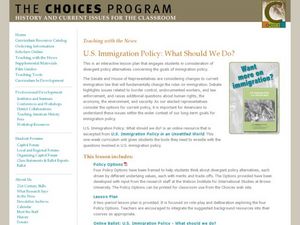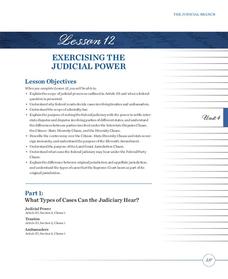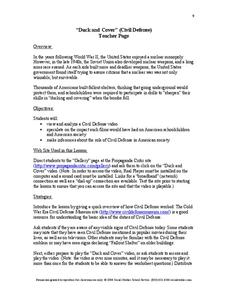Curated OER
Citizens of the Future
Young sociologists explore how local, state, and federal governments work. This very impressive and ambitious lesson requires pupils to contact government officials who represent them and their families. They research elections, and hold...
Curated OER
The Kite Runner: Citizenship Test
Could you pass a citizenship test? As part of their study of Khaled Hosseini's The Kite Runner and the immigrant experience, class members are presented with a sample citizenship test.
C-SPAN
Presidential Birth Requirement
Every president of the United States must be a natural-born citizen, but the definition of natural-born is not as straightforward as it seems. Secondary scholars examine two points of view surrounding the constitutional requirement and...
NYC Department of Records
Citizenship and Elections: The Importance of a Ballot
Approximately 58 prcent of those eligible voted in the 2016 US Presidential election. In an attempt to impress upon learners the importance of voting and voting rights, class members examine primary source documents related to the...
Center for Civic Education
Citizenship Schools and Civic Education During the Civil Rights Movement and in the Present
Your young historians will discover the importance that citizenship education has played in the social progress of the United States as they learn about early efforts to discourage African Americans from voting in the 1960s.
Curated OER
FROM STUDENT TO GLOBAL CITIZEN
Learners develop an awareness of citizenship and how it's defined globally. They explore the cultural diversity of different types of communities around the world. In addition, they assess the rights and responsibilities that are...
Center for Civic Education
Becoming a Voter
What are the requirements to register to vote in the United States? Young citizens evaluate this process by working with handouts, informational texts, discussion, and research, as well as complete a sample voter registration form.
Center for Civic Education
Constitution Day Rap
Engage your class while learning about the US Constitution with this fun primary grade social studies lesson. After viewing a picture of the US Constitution, young learners piece together a US flag using stars and stripes with facts...
Curated OER
Who are American Citizens?
Students investigate American citizenship. In this civics lesson, students consider the basic knowledge of U. S. government new citizens are required to have. Students also examine the 14th amendment that describes U. S. citizenship.
Curated OER
Teaching With Documents: U.S. Constitution Workshop
What does it mean to be American? Explore the constitution and what it really means to be a citizen here. First, learners of all ages will investigate different primary source documents. Then, they establish each document's...
Center for Civic Education
What Basic Ideas Are in the Preamble to the Constitution?
Introduce young historians to the US Constitution with this upper-elementary social studies lesson plan. Beginning with a general discussion about the role of government in society, students go on to work in small groups identifying and...
Center for Civic Education
What Basic Ideas About Government Are Included in the Preamble to the Constitution?
Young historians explore the meaning of the Preamble to the US Constitution in this upper-elementary social studies lesson. Working with partners or in small groups, children discuss the purpose of government before reading and analyzing...
Curated OER
US Immigration Policy: What Should We Do?
Students evaluate immigration policies. In this global issues lesson, students analyze the long-term goals of divergent immigration policies as they role play the deliberation process.
Center for Civic Education
Matching Game with the US Constitution
In September we celebrate Constitution Day. Begin the celebration with a grand conversation about the US Constitution. Follow up the in-depth discussion with a learning game in which scholars match terms to images such as the...
Curated OER
Citizenship Worksheet 4 - Selecting Leaders
In this United States citizenship worksheet, students learn the process for how leaders are elected in the United States. Students are challenged with discussion and research questions and exercises that support the information they...
Center for Civic Education
Orb and Effy Learn About Authority
Simplify the teaching of the US Constitution with this primary grade social studies lesson. While reading a fun story about an imaginary place called Bubble Land, children learn about the concept of authority and the importance of rules...
Curated OER
Road Manners
Learners examine manners and citizenship. In this citizenship and safety lesson, students build an understanding of the relationship between good manners and safety. Learners talk about what good divers do to be safe on the road, then...
Roy Rosenzweig Center for History and New Media
The Homestead Act
To understand how the Homestead Act of 1862 changed the US and the lives of the people during that time, class members examine primary source materials including letters, broadsides, and images. They then assume the voice of a...
University of Arkansas
Assessment and Discussion
"Without concerned citizen action to uphold them (human rights) close to home; we shall look in vain for progress in the larger world. . ." Eleanor Roosevelt's comment is used to set the stage for the conclusion of a five-lesson unit...
Heritage Foundation
Exercising Judicial Power
We should all do more exercising, but should the judicial branch as well? High schoolers develop their understanding of what powers the judicial branch carries because of the US Constitution, as well as where their limits lie in the...
Humanities Texas
Primary Source Worksheet: Thomas Jefferson, Message to Congress Concerning Louisiana
Proficient reading of informational text, especially primary source documents, requires practice. This message from Thomas Jefferson about the Louisiana Purchase offers readers a chance to develop these comprehension skills.
Judicial Learning Center
The Ratification Debate
Most Americans profess their love for the US Constitution, but this was not always the case. An informative lesson overviews the debate between the Federalists and Anti-Federalists by summarizing the main arguments of each side. It...
Curated OER
US Civil Rights Movement: Beginnings through the 60s
A real find for a U.S. History teacher, this presentation could supplement many class sessions about the Civil Rights Movement. Pictures of events, major figures, and "Whites Only" signs are striking and effective for even your most...
Social Studies School Service
“Duck and Cover” (Civil Defense)
Bert the Turtle models for viewers the 1950s Civil Defense Duck and Cover strategy that was supposed to protect citizens from a nuclear blast. After viewing the video, watchers are asked to consider the motivations of the producers of...

























